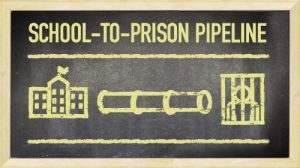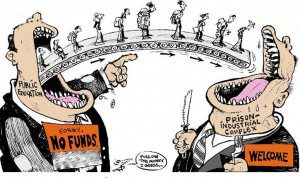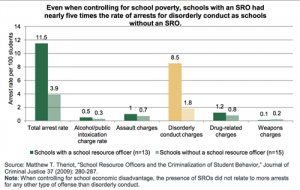“An 11-year-old at a middle school in Highlands Ranch, Colo., took a lollipop from a jar on the teacher’s desk and was charged with theft. The boy was convicted of a misdemeanor and put on probation.”
~Teaching Tolerance, Southern Poverty Law Center

ACLU, School-to-Prison Pipeline Infographic. Retrieved from: https://www.aclu.org/feature/school-prison-pipeline
What is the School to Prison Pipeline?
The School to Prison Pipeline (SPP) is a phrase used to explain the phenomenon of public school policies and practices that push students, predominately black and brown students in urban public schools, out of schools and into prisons.
How does a person who goes to school end up in prison?
It may seem weird that schools which are supposed to provide youth with an education in order to go on and be great leaders in the world are instead funneling them into the criminal justice system. However, it happens everyday. Below describes a culmination of practices and policies that have caused urban public schools to over-criminalize children and adolescent behavior, focusing more on punishing students instead of educating them.

Suspension Stories. Retrieved from: http://www.suspensionstories.com/school-to-prison-pipeline/
This photo highlights that the lack of funding in urban public schools to provide resources to prevent students from being involved in the criminal justice system.
How Does it Work?
Zero-Tolerance Policies
Zero-tolerance policies are practices that have “zero tolerance” for misbehavior. This means that once a student breaks a rule that are immediately subject to consequences, legal consequences in many cases that result in suspension or worse, arrest (Wilson, 2014). This practice is detrimental to a school community because instead of focusing on understanding why the student did what they did and helping them understand that it was wrong, students are unnecessarily punished and may never get the chance to redeem themselves and learn from their mistakes. Watch the video below to see a few examples of how zero-tolerance policies can go too far.
Over-policing of Schools
School Resource Officers, SROs, hold a controversial place in their role in enforcing the school-to-prison pipeline. The Justice Policy Institute explains that schools that have SROs are more likely to arrest students for minor behaviors such as “disorderly conduct” putting the student in contact with the criminal justice system when the situation could have been handled outside of the courts by school administration (Justice Policy Institute, 2015).

Justice Policy Institute, 2014. Retrieved from http://www.justicepolicy.org/news/8775
Who is Affected?
Unfortunately, black students are more likely to be affected by the school-to-prison pipeline than any other group (Justice Policy Institute, 2015). With that being said, any marginalized group that is at high-risk for misbehaving or not performing well academically is greatly impacted by the school-to-prison pipeline (e.g. minority groups and students with disabilities).
